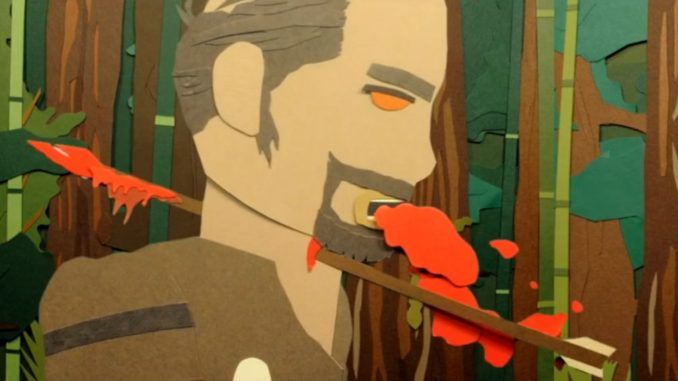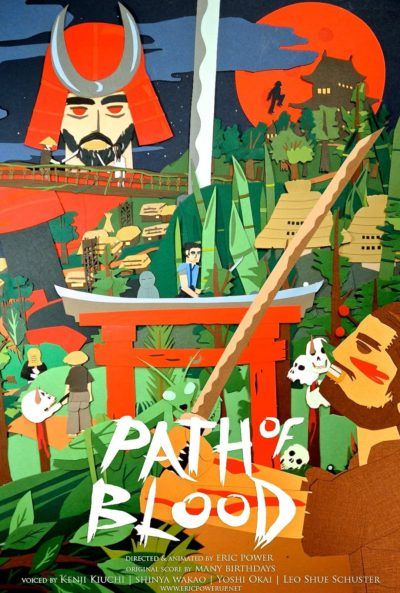
Rating: C
Dir: Eric Power
Star (voice): Kenji Kiuchi, Yoshi Okai, Leo Shue Schuster, Shinya Wakao
The C here is mostly for effort, because I certainly don’t want to diminish or downplay the remarkable amount of work that went into this. As the images likely have already informed you, it is an animated effort done using paper – if you’re thinking it’s similar in style to South Park, you’re right, though what you get here is considerably greater in detail. Even more impressively, it’s basically a one-man job, Power having created the whole 61-minute feature himself, in between taking conventional work to pay the bills. It’s the kind of commitment and effort which can only be admired, speaking as someone who has enough unfinished projects to fill a book (I’m still importing old reviews here, seven years in).
Events take place in the year 1614, when Japan was going through a state of flux, and there were a lot of masterless samurai, known as ronin, wandering the land and lopping each other’s bits off. The hero is Kazuo (Kiuchi), who goes on a fairly boilerplate hero’s quest, after hearing about a mountain path with basically three wishes at the end. Naturally, said path is highly fraught with danger, and he’ll need to keep his wits about him, if he’s to keep his limbs about him. Really, that’s about the extent of the plotting, and even at barely an hour long, the content feels thinly-stretched, with a lot of shots that seem to border on padding, before we get to the boss level.
 I did appreciate the way Power opted to make the entire thing in Japanese, which enhances the feel of it being a genuine work of chanbara. However, I could have done with some greater differentiation in the voice actors, who all adopt the generic samurai growl, and end up blurring into each other as a result. It fares better on the visual side, going full-bore into the violence you’d expect from the genre – and perhaps even beyond that at some points. Yet I was left to a certain extent feeling a similar way I do about animated kung-fu. The impact is inevitably less, when it’s not “real” people who are carrying out the violence, the medium inevitably adding a distancing effect to the carnage.
I did appreciate the way Power opted to make the entire thing in Japanese, which enhances the feel of it being a genuine work of chanbara. However, I could have done with some greater differentiation in the voice actors, who all adopt the generic samurai growl, and end up blurring into each other as a result. It fares better on the visual side, going full-bore into the violence you’d expect from the genre – and perhaps even beyond that at some points. Yet I was left to a certain extent feeling a similar way I do about animated kung-fu. The impact is inevitably less, when it’s not “real” people who are carrying out the violence, the medium inevitably adding a distancing effect to the carnage.
It’s kinda sad that, more than a decade after release, this has received precisely thirty-four votes on the IMDb. Hopefully its presence on Tubi might at least get a few more eyeballs on something which deserves far greater exposure than that. Despite its flaws, mad props are due to Power for sheer, bloody-minded dedication to his task, which I imagine probably had him thinking “Screw this for a game of soldiers” on a good number of occasions. It’s genuinely something the likes of which I had never seen before. If you enjoyed the likes of Phil Tippett’s Mad God, then you could do a lot worse than giving this a shot, an example of the auteur theory applied to animation.
